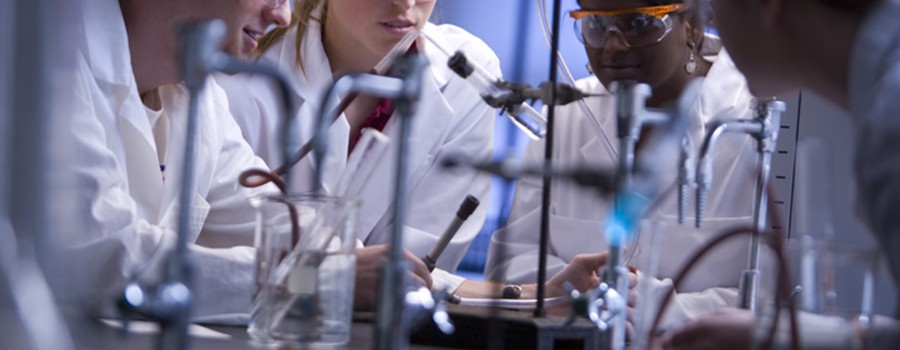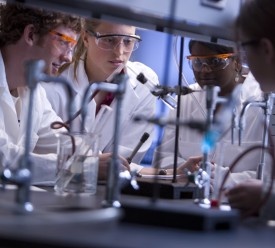Composition, action, reaction – it's chemistry. And the world should be taught about it.
Learn basic scientific principles and valuable chemistry knowledge, plus the skills essential to becoming an impactful educator. Our Department of Chemistry is equipped with top-notch laboratories and classrooms that will benefit you throughout your time in the program. Within your senior year of your chemistry education degree, you will complete a research project with an area of special interest, which has the chance to be recognized at a professional research institution. In the past, our students’ projects have been selected for summer programs at research institutions such as Oak Ridge National Laboratory, Massachusetts Institute of Technology, Clemson University, Notre Dame, Brown University, and the Natural History Museum in London England. Additionally, as part of this education in chemistry program, you'll have the opportunity to join the Alchemist Club (an affiliate of the American Chemical Society) with field trips and special events.
By the Numbers
$61,820
5%
1 in 5
80%
Programs & Requirements
* The credit hours listed on this page only reference the specific program requirements and is not reflective of the total hours necessary to receive your degree. Cumberlands requires all students obtain a minimum of 60 hours for an associate’s degree and a total of 120 hours for a bachelor’s degree. Transfer and prior learning credits may be counted toward those totals.
To learn more about our General Education Requirements, please visit the page referenced below or explore our Academic Catalog.
Bachelor of Science in Chemistry Education
What makes this education in chemistry program different from a basic chemistry degree? In short, that this chemistry education degree program also equips you with all you need to earn certification to teach high school science classes. Lesson planning, evaluating student progress, personalizing instruction – you'll be trained in these skills and more. Along with educational training, you will gain an understanding of general science, with a special emphasis in chemistry. Explore general chemistry, organic chemistry, biochemistry, and analytical chemistry while simultaneously strengthening your teaching skills.
Notes:
*Additional 42 hours of professional education courses required for secondary education Students are encouraged to take other advanced courses, such as:
CHEM 432 - Physical Chemistry II and CHEM 412 - Physical Chemistry Laboratory II.
CHEM 491 requirement may be replaced with CHEM 436 - Instrumental Analysis
Course Requirements
- CHEM 132 - General College Chemistry I
- CHEM 111 - General Chemistry Laboratory I
- CHEM 232 - General College Chemistry II
- CHEM 211 - General Chemistry Laboratory II
- CHEM 331 - Organic Chemistry I
- CHEM 321 - Organic Chemistry Laboratory I
- CHEM 332 - Organic Chemistry II
- CHEM 322 - Organic Chemistry Laboratory II
- CHEM 336 - Analytical Chemistry
- CHEM 328 - Analytical Chemistry Laboratory
- CHEM 441 - Physical Chemistry I with Laboratory
- CHEM 413 - Teaching Practicum in Chemistry
- CHEM 434 - Inorganic Chemistry
- CHEM 490 - Senior Research Project
- CHEM 491 - Selected Topics in Chemistry OR BIOL 346 - Biochemistry
In addition to the required chemistry and math courses, 42 hours of professional education courses are required as defined by University of the Cumberlands' Department of Education. View our course catalog for details.
A Bachelor of Arts requires all the same courses as a Bachelor of Science with the addition of four classes (12 hours) in a foreign language.
Choose one foreign language sequence:
- FREN 131 Elementary French I
- FREN 132 Elementary French II
- FREN 231 Intermediate French I
- FREN 232 Intermediate French II
- SPAN 131 Elementary Spanish I
- SPAN 132 Elementary Spanish II
- SPAN 231 Intermediate Spanish I
- SPAN 232 Intermediate Spanish II
Take the Next Step
Mission & Goals
The purpose of the chemistry education program at University of the Cumberlands is to prepare you to move directly into either a graduate program or a teaching career – stepping onto either path as a highly qualified, knowledgeable, and caring person.
Chemistry Careers & Outcomes
All stats from U.S. Bureau of Labor Statistics
Chemistry Teacher: $61,820
Chemistry Teacher: $61,820
Teaching students chemistry concepts at the secondary level.
Chemist: $79,760
Chemist: $79,760
Chemists research and analyze the chemical properties of different substances and materials and develop new materials and products.
Chemical Technician: $48,990
Chemical Technician: $48,990
Conduct laboratory tests and help scientists with analyzing materials.
Forensic Science Technician: $61,930
Forensic Science Technician: $61,930
Collect and analyze evidence from crime scenes to help criminal investigators with their investigation.
Environmental Science Specialist: $76,530
Environmental Science Specialist: $76,530
Work in protecting the environment and human health.
Physician Assistant: $121,130
Physician Assistant: $121,130
Examine, diagnose, and treat patients under the supervision of a physician (will require additional education after bachelor’s degree).
Common Questions
A chemistry education degree combines a solid understanding of chemistry principles with the pedagogical skills necessary to teach the subject effectively. It prepares graduates to educate others in chemistry, fostering a deeper understanding of scientific concepts and their applications.
Typically, a chemistry education degree takes about four years to complete, requiring approximately 36 credit hours specifically for the major. This duration may vary based on the program structure and the student's course load.
Yes, many institutions offer online options for chemistry education degrees, providing flexibility for students to complete their coursework remotely. It's important to check specific programs for availability.
A chemistry education degree can be worthwhile for those passionate about teaching and science. Graduates are equipped for a variety of career opportunities, and the demand for qualified chemistry teachers is growing, making it a potentially rewarding investment.
With a chemistry education degree, you can pursue several career paths, including high school chemistry teacher, chemist, chemical technician, forensic science technician, environmental science specialist, or even a physician assistant (with additional education).
To obtain a chemistry education degree, you typically need to enroll in an accredited program, complete the required coursework, and fulfill any state-specific certification requirements for teaching. This often includes student teaching experience.
Chemistry education focuses on the methods and techniques for teaching chemistry, whereas chemistry itself is the study of the properties and behavior of matter. A chemistry education degree integrates both scientific knowledge and educational training.
Most chemistry teachers hold at least a bachelor's degree in chemistry education or a related field. This degree includes coursework in chemistry, education theory, and teaching methods.
To become a college chemistry teacher, you typically need to earn a master's or doctoral degree in chemistry or a related field. Additionally, gaining teaching experience, conducting research, and publishing in academic journals can enhance your qualifications for college-level positions.
Faculty Experts in Chemistry
Learn more about your future chemistry and education professors.

Jeffrey Schwarz
Jeffrey Schwarz
Contact Information

Dr. Julie Tan
Dr. Julie Tan
Contact Information

Dr. Amber Randolph
Request Information
Let us know any questions you have, and we'll reach out to you soon with information.

